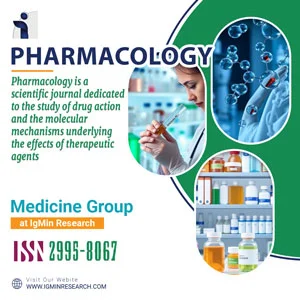Open Access Policy refers to a set of principles and guidelines aimed at providing unrestricted access to scholarly research and literature. It promotes the free availability and unrestricted use of research outputs, enabling researchers, students, and the general public to access, read, download, and distribute scholarly articles without financial or legal barriers. In this response, I will provide you with an overview of the history and latest resolutions related to Open Access Policy.
About
Pharmacology is a crucial discipline within medical and biological sciences that examines the effects of drugs and substances on living organisms. This field investigates how various compounds interact with biological systems to produce therapeutic or adverse effects. By studying pharmacological mechanisms, researchers develop safer and more effective medications, contributing to improved patient care and well-being.
The study of pharmacology encompasses a diverse range of topics, including pharmacokinetics (drug absorption, distribution, metabolism, and excretion), pharmacodynamics (mechanisms of drug action), and toxicology (effects of substances on health). Pharmacologists work to understand the molecular targets of drugs, optimize dosages, and develop strategies to mitigate adverse effects. This knowledge is essential for advancing medical treatments and ensuring patient safety.
Editors
Medicine Group (3)
Open Access Policy refers to a set of principles and guidelines aimed at providing unrestricted access to scholarly research and literature. It promotes the free availability and unrestricted use of research outputs, enabling researchers, students, and the general public to access, read, download, and distribute scholarly articles without financial or legal barriers. In this response, I will provide you with an overview of the history and latest resolutions related to Open Access Policy.
Open Access Policy refers to a set of principles and guidelines aimed at providing unrestricted access to scholarly research and literature. It promotes the free availability and unrestricted use of research outputs, enabling researchers, students, and the general public to access, read, download, and distribute scholarly articles without financial or legal barriers. In this response, I will provide you with an overview of the history and latest resolutions related to Open Access Policy.

Why publish with us?
Global Visibility – Indexed in major databases
Fast Peer Review – Decision within 14–21 days
Open Access – Maximize readership and citation
Multidisciplinary Scope – Biology, Medicine and Engineering
Editorial Board Excellence – Global experts involved
University Library Indexing – Via OCLC
Permanent Archiving – CrossRef DOI
APC – Affordable APCs with discounts
Citation – High Citation Potential
Which articles are now trending?
Research Articles
- Challenge and Readiness to Implemented Geothermal Energy in Indonesia
- The Cancer Stem Cell Concept as Applied to Prostate Cancer
- Immobilization of 7-Iodo-8-hydroxyquinoline-5-sulfonic Acid (Ferron): A Comprehensive Review of Techniques and Applications
- Cyber Threat Analysis (CTA) in Current Conflicts
- Integrated Multi-fidelity Structural Optimization for UAV Wings
- Use of Augmented Reality as a Radiation-free Alternative in Pain Management Spinal Surgeries
Advertisement
















